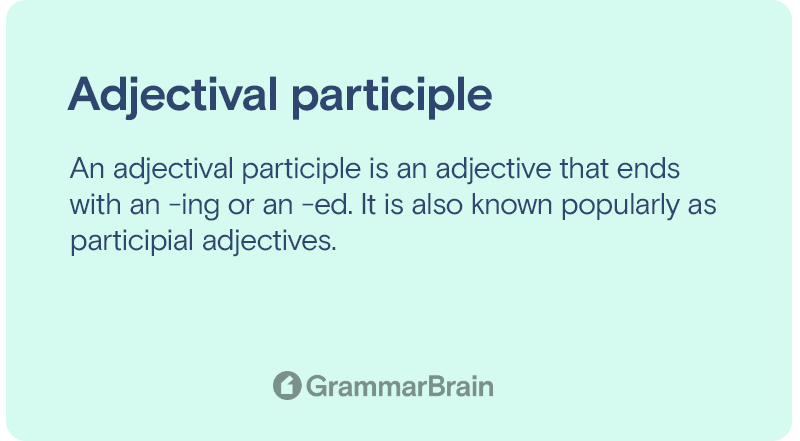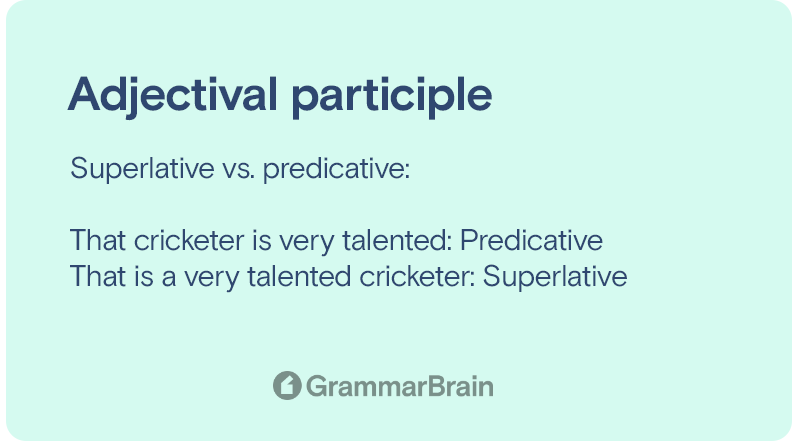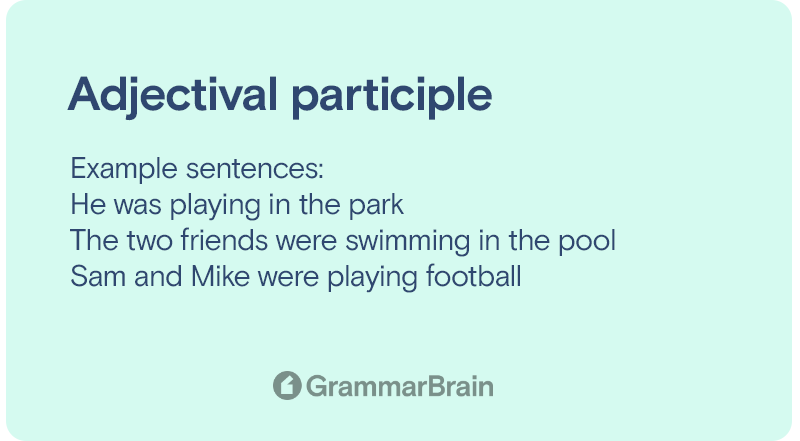What is an adjectival participle? And how is it different form other participle forms? There are typically three types of participles in the English language (past, present, and future). How does this type of participle fit in? To learn more, continue reading.

What is an adjectival participle?
An adjectival participle is an adjective that ends with an -ing or an -ed. It is also known popularly as participial adjectives. Adjectives are words that typically alter or characterize the subject of a noun, pronoun, or noun phrase. Understanding an adjective is the first step to understanding an adjectival participle.
Participles are words that are commonly thought of as verbs. However, they also function as a part of adjectives or as modifiers. The categorization depends upon the context and the usage of the participle.
In this capacity, participles can be of two types:
- Present Adjectival Participle
- Past Adjectival Participle
We will go over them in more detail in the coming sections.

Grammar rules
As per the basic rules of grammar, when participles choose to participate in the adjectival antics, this kind of adjective is referred to as a participial adjective.
In most cases, the adjectival participles function as superlative and predicative adjectives. Let’s look at some examples to understand this better:
- This is a frightening movie: Superlative
- This movie is frightening: Predicative
- That cricketer is very talented: Predicative
- That is a very talented cricketer: Superlative
Why do we have them?
Adjectival participles are used in numerous ways and on various occasions. A participial adjective is usually used when a participle behaves like an adjective. This is when a participle describes a noun or a pronoun.
Present participle adjectival
A present participle adjectival is a term that can be used as an adjective or verb. A word in this form can be used as a modifier or even in verb tenses.
Grammar rules
As per the grammar rules, a present adjectival participle is a word that ends with -ing. Some examples of these include:
- Swimming
- Laughing
- Working
- Playing

Sentence examples
While present participle adjectives usually refer to a single word, let’s understand their usage better through some examples.
Here are some examples of present participle adjectives in sentences:
- He was playing in the park
- The two friends were swimming in the pool
- Sam and Mike were playing football
- Lina told me she will start working at the restaurant tomorrow.
Past participle adjectival
As opposed to a present participle adjective, a past participle adjectival refers to the past tense of the verb. If the word used in a sentence is a regular verb, the past participle will end in -ed. However, if it is irregular, it can terminate differently.
Grammar rules
As per the grammatical rules governing the past participle adjectival, the verbs will end in the past tense. Depending upon whether the verb is regular or irregular, these participle adjectivals can end in -ed or -t.
Let’s look at some examples to understand it better:
- Burned
- Burnt
- Painted
- Believed
- Deceived
Sentence examples
Let’s see how past participle adjectivals can be used in sentences. Some examples of past participle adjectivals in sentences are:
- I wish to have a freshly painted room.
- She took out a fully burnt pie from the oven.
FAQs
What is a participle adjective example?
Some examples of participle adjectives are:
- A frightening movie
- A talented person
- A well-written book
- A talented swimmer
Is participle a verb or adjective?
A participle usually refers to a verb that can act as an adjective in a given scenario. When the participle has the ability to describe a noun, it becomes an adjectival participle.
Inside this article
Fact checked:
Content is rigorously reviewed by a team of qualified and experienced fact checkers. Fact checkers review articles for factual accuracy, relevance, and timeliness. Learn more.
Core lessons
Glossary
- Abstract Noun
- Accusative Case
- Anecdote
- Antonym
- Active Sentence
- Adverb
- Adjective
- Allegory
- Alliteration
- Adjective Clause
- Adjective Phrase
- Ampersand
- Anastrophe
- Adverbial Clause
- Appositive Phrase
- Clause
- Compound Adjective
- Complex Sentence
- Compound Words
- Compound Predicate
- Common Noun
- Comparative Adjective
- Comparative and Superlative
- Compound Noun
- Compound Subject
- Compound Sentence
- Copular Verb
- Collective Noun
- Colloquialism
- Conciseness
- Consonance
- Conditional
- Concrete Noun
- Conjunction
- Conjugation
- Conditional Sentence
- Comma Splice
- Correlative Conjunction
- Coordinating Conjunction
- Coordinate Adjective
- Cumulative Adjective
- Dative Case
- Determiner
- Declarative Sentence
- Declarative Statement
- Direct Object Pronoun
- Direct Object
- Diction
- Diphthong
- Dangling Modifier
- Demonstrative Pronoun
- Demonstrative Adjective
- Direct Characterization
- Definite Article
- Doublespeak
- False Dilemma Fallacy
- Future Perfect Progressive
- Future Simple
- Future Perfect Continuous
- Future Perfect
- First Conditional
- Irregular Adjective
- Irregular Verb
- Imperative Sentence
- Indefinite Article
- Intransitive Verb
- Introductory Phrase
- Indefinite Pronoun
- Indirect Characterization
- Interrogative Sentence
- Intensive Pronoun
- Inanimate Object
- Indefinite Tense
- Infinitive Phrase
- Interjection
- Intensifier
- Infinitive
- Indicative Mood
- Participle
- Parallelism
- Prepositional Phrase
- Past Simple Tense
- Past Continuous Tense
- Past Perfect Tense
- Past Progressive Tense
- Present Simple Tense
- Present Perfect Tense
- Personal Pronoun
- Personification
- Persuasive Writing
- Parallel Structure
- Phrasal Verb
- Predicate Adjective
- Predicate Nominative
- Phonetic Language
- Plural Noun
- Punctuation
- Punctuation Marks
- Preposition
- Preposition of Place
- Parts of Speech
- Possessive Adjective
- Possessive Determiner
- Possessive Case
- Possessive Noun
- Proper Adjective
- Proper Noun
- Present Participle
- Prefix
- Predicate



